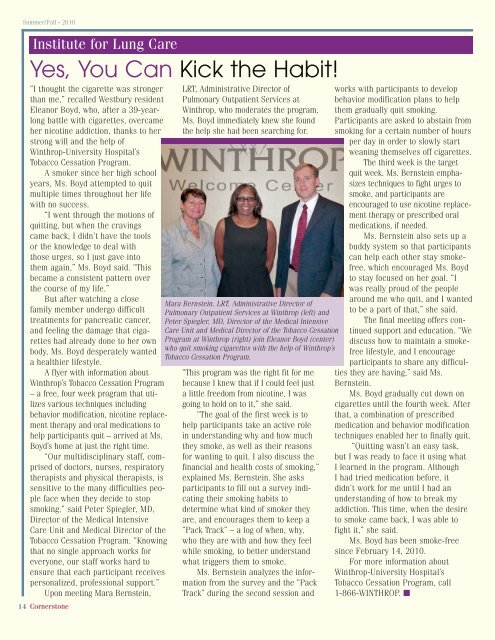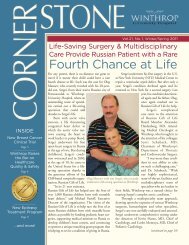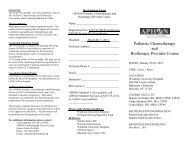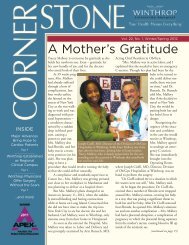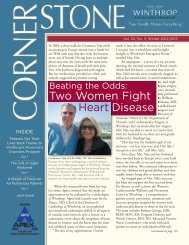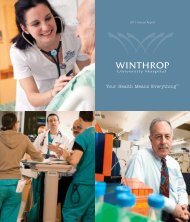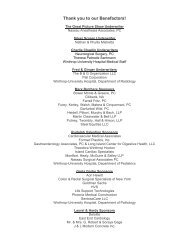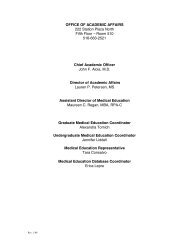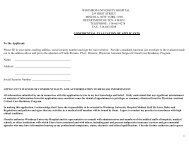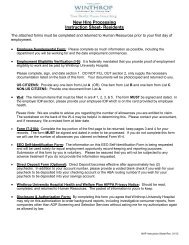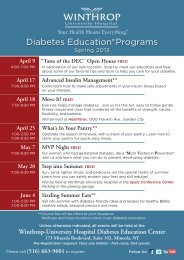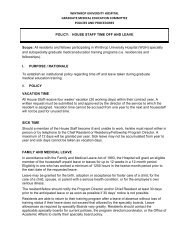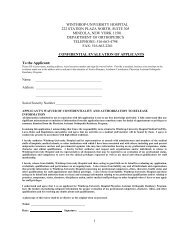Cnrstn 09.10 - Winthrop University Hospital
Cnrstn 09.10 - Winthrop University Hospital
Cnrstn 09.10 - Winthrop University Hospital
Create successful ePaper yourself
Turn your PDF publications into a flip-book with our unique Google optimized e-Paper software.
Summer/Fall • 2010Institute for Lung CareYes, You Can Kick the Habit!“I thought the cigarette was strongerthan me,” recalled Westbury residentEleanor Boyd, who, after a 39-yearlongbattle with cigarettes, overcameher nicotine addiction, thanks to herstrong will and the help of<strong>Winthrop</strong>-<strong>University</strong> <strong>Hospital</strong>’sTobacco Cessation Program.A smoker since her high schoolyears, Ms. Boyd attempted to quitmultiple times throughout her lifewith no success.“I went through the motions ofquitting, but when the cravingscame back, I didn’t have the toolsor the knowledge to deal withthose urges, so I just gave intothem again,” Ms. Boyd said. “Thisbecame a consistent pattern overthe course of my life.”But after watching a closefamily member undergo difficulttreatments for pancreatic cancer,and feeling the damage that cigaretteshad already done to her ownbody, Ms. Boyd desperately wanteda healthier lifestyle.A flyer with information about<strong>Winthrop</strong>’s Tobacco Cessation Program– a free, four week program that utilizesvarious techniques includingbehavior modification, nicotine replacementtherapy and oral medications tohelp participants quit – arrived at Ms.Boyd’s home at just the right time.“Our multidisciplinary staff, comprisedof doctors, nurses, respiratorytherapists and physical therapists, issensitive to the many difficulties peopleface when they decide to stopsmoking,” said Peter Spiegler, MD,Director of the Medical IntensiveCare Unit and Medical Director of theTobacco Cessation Program. “Knowingthat no single approach works foreveryone, our staff works hard toensure that each participant receivespersonalized, professional support.”Upon meeting Mara Bernstein,14 CornerstoneLRT, Administrative Director ofPulmonary Outpatient Services at<strong>Winthrop</strong>, who moderates the program,Ms. Boyd immediately knew she foundthe help she had been searching for.Mara Bernstein, LRT, Administrative Director ofPulmonary Outpatient Services at <strong>Winthrop</strong> (left) andPeter Spiegler, MD, Director of the Medical IntensiveCare Unit and Medical Director of the Tobacco CessationProgram at <strong>Winthrop</strong> (right) join Eleanor Boyd (center)who quit smoking cigarettes with the help of <strong>Winthrop</strong>’sTobacco Cessation Program.“This program was the right fit for mebecause I knew that if I could feel justa little freedom from nicotine, I wasgoing to hold on to it,” she said.“The goal of the first week is tohelp participants take an active rolein understanding why and how muchthey smoke, as well as their reasonsfor wanting to quit. I also discuss thefinancial and health costs of smoking,”explained Ms. Bernstein. She asksparticipants to fill out a survey indicatingtheir smoking habits todetermine what kind of smoker theyare, and encourages them to keep a“Pack Track” – a log of when, why,who they are with and how they feelwhile smoking, to better understandwhat triggers them to smoke.Ms. Bernstein analyzes the informationfrom the survey and the “PackTrack” during the second session andworks with participants to developbehavior modification plans to helpthem gradually quit smoking.Participants are asked to abstain fromsmoking for a certain number of hoursper day in order to slowly startweaning themselves off cigarettes.The third week is the targetquit week. Ms. Bernstein emphasizestechniques to fight urges tosmoke, and participants areencouraged to use nicotine replacementtherapy or prescribed oralmedications, if needed.Ms. Bernstein also sets up abuddy system so that participantscan help each other stay smokefree,which encouraged Ms. Boydto stay focused on her goal. “Iwas really proud of the peoplearound me who quit, and I wantedto be a part of that,” she said.The final meeting offers continuedsupport and education. “Wediscuss how to maintain a smokefreelifestyle, and I encourageparticipants to share any difficultiesthey are having,” said Ms.Bernstein.Ms. Boyd gradually cut down oncigarettes until the fourth week. Afterthat, a combination of prescribedmedication and behavior modificationtechniques enabled her to finally quit.“Quitting wasn’t an easy task,but I was ready to face it using whatI learned in the program. AlthoughI had tried medication before, itdidn’t work for me until I had anunderstanding of how to break myaddiction. This time, when the desireto smoke came back, I was able tofight it,” she said.Ms. Boyd has been smoke-freesince February 14, 2010.For more information about<strong>Winthrop</strong>-<strong>University</strong> <strong>Hospital</strong>’sTobacco Cessation Program, call1-866-WINTHROP. ■


